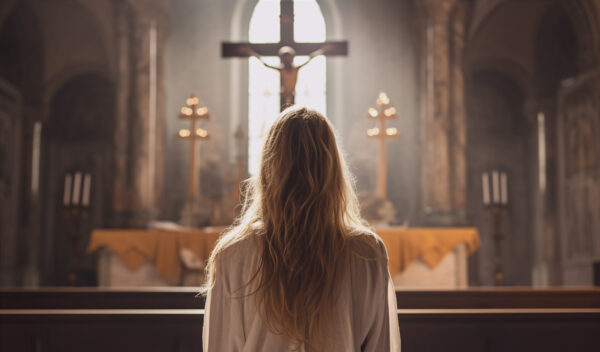Just down the street from my Cincinnati home is a Franciscan convent. I walk there frequently, spying into the frost-laden community garden, feeling the wind that rushes over my head and into the stone convent walls, talking on the phone while enjoying the crunch of old acorns and crackling ice beneath my shoes. Just beyond the chapel and main campus is a small uphill path overshadowed by drooping branches and the shadows of large stone Stations of the Cross. At the top of this incline is a field ensconced in a circle of trees, once richly clothed, but now barren with their crude branches silhouetted against the gray winter sky. Although I can hear a nearby train whistle and a neighborhood dog seeking to guard his home, the prominent noises are the trills of birds against the background hum of crickets and rustling brown leaves. There’s a stillness here that so sharply contrasts the roar of this terrified, restless world.
It’s a stillness that we breathing souls are not yet called to know. I write this in the sisters’ cemetery.
I’ve been acquainted with cemeteries from a young age, whether in visiting the graves of family members to pray for their souls, or as a part of homeschool field trips. But there’s something remarkably different about this graveyard. When taking a field trip to visit the mausoleum of poet James Whitcomb Riley, I stood in awe as a grade-schooler at the honor still paid to this man. But there is no mausoleum here. I remember visiting my grandfather’s grave and looking at the myriad flowers dotting the varied tombstones throughout the cemetery. But I only see a few flowers here. And all of the grave markers are identical.
They are all so uniform, these austere oval slabs hidden near the woods. I look at the names on each tombstone. “Sr. M. Assumpta.” “Sr. M. Cordula.” “Sr. M. John.” All names so mysterious, yet still monotonous. I investigate the dates. These sisters lived long lives. I wonder what those lives looked like, ponder who these women are lying at my feet, veiled by the ground. We Catholics love to talk about the feminine genius. What spark of that genius caused those buried here to run after this end of lying hidden even from Midwestern back roads?
These sisters weren’t hidden only in their interment. There’s nothing notable about this convent, one of several in the historically Catholic Cincinnati. And even if there was, this hidden cemetery is the period placed on their stories on this side of eternity. James Whitcomb Riley’s tomb may be more impressive to behold, but it is merely a facade of grandeur. His body is consumed by the same dirt that holds the bodies of these invisible sisters.
One day, I will lie in that dirt. So will you, dear reader. Even the prominent men and women we encounter in history classes will be forgotten one day. As our country merely grows in chaos and noise, I am so grateful that the Church stands firm in its exhortation to call to mind our own mortality and the truth that temporality is merely a seduction.
And what of that mortality and temporality? If all fades away, what is the point of this life? What do we strive after? My own question is answered as I walk further along the cemetery path. At the edge of the graveyard is a large white monument boasting a nearly life-size crucifix. Even its whitewashed plaster cannot hide the agony of the man’s suffering, of God’s very lungs suffocating. And yet, in that abyss of misery, Christ’s arms are open, outstretched in surrender to the Father, vulnerable in his unfathomable love for us. As I stare at this crucifix, I hear the Lord’s call mirroring the Song of Songs, “‘Arise, my friend, my beautiful one, and come!’ Ascend to the cross with me. Do not be afraid of my wounds” (cf. Song 2:10).
As I hear that voice, I realize why these women could throw away their lives and be content hidden in life and now in death. I realize that while my life looks very different from theirs, I too can be content in the darkness of this world that is not our home, unafraid of littleness and obscurity, undaunted by the hiddenness and loneliness we have all experienced during this pandemic. Like Paul, I can be confident in my endurance of all, because my strength is not my own. It is the Lord’s, the one whose scourged arms were flung open to receive these faithful departed daughters at the hour of their quiet, unobserved death.
His arms are open to you and me. The only tragedy we can know is to be unprepared for that embrace when it comes.
Larisa Tuttle is a trainee with Cincinnati Ballet and is passionate about the healing and evangelistic power of the arts. She loves volunteering in middle school youth ministry and striving to share the gift of the Eucharist with as many people as possible. When she isn’t writing or dancing, she’s probably reading Thomas Dubay or C.S. Lewis while drinking coffee at odd hours of the night. You can find her online at livingfullthrottle.com and @livingfullthrottle.




